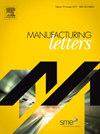基于可重构工具的柔性拉伸弯曲变形特性实验与数值研究
IF 2
Q3 ENGINEERING, MANUFACTURING
引用次数: 0
摘要
在金属成形过程中实现高尺寸精度是必不可少的,因为这直接影响产品的性能,功能和美观。了解和控制影响金属成形变形行为的因素,包括回弹和局部变形,可以提高产品的完整性和成形及后续装配操作的效率。采用一种新颖的多点可重构模具系统,研究了拉伸弯曲成形的AA6082-T4挤压件的局部和全局变形特性。在实验结果的基础上,对三种不同模具半径(R1000、R1500和R1750 mm)的尺寸特性进行了有限元分析。研究结果强调了离散多点工具在运动控制的弯曲和拉伸过程中对回弹后整体变形行为的影响,包括弦高。此外,本研究的结果用于定义局部变形的范围,确保使用可重构多点工具制造的成形产品的整体变形保持在可接受的公差范围内。本文章由计算机程序翻译,如有差异,请以英文原文为准。
An experimental and numerical study of deformation characteristics in flexible stretch bending using reconfigurable tools
Achieving high dimensional accuracy in metal forming processes is essential as this directly impacts product performance, functionality, and aesthetics. Understanding and controlling the factors that influence deformation behavior in metal forming, including springback and local distortions, can improve product integrity and the efficiency of forming and subsequent assembly operations. This study investigates local and global deformation characteristics of AA6082-T4 extrusions formed in stretch bending, using a novel multi-point reconfigurable die system. The experimental results are supplemented by finite element method (FEM) analysis to assess dimensional characteristics using three different die radii (R1000, R1500, and R1750 mm). The findings highlight the influence of discrete multi-point tool on overall deformation behavior after springback, including chord height de, during kinematically controlled bending and stretching. Furthermore, the results from this study serve to define the range of local deformation ensuring global deformation to remains within acceptable tolerance limits for formed products manufactured with reconfigurable multi-point tools.
求助全文
通过发布文献求助,成功后即可免费获取论文全文。
去求助
来源期刊

Manufacturing Letters
Engineering-Industrial and Manufacturing Engineering
CiteScore
4.20
自引率
5.10%
发文量
192
审稿时长
60 days
 求助内容:
求助内容: 应助结果提醒方式:
应助结果提醒方式:


